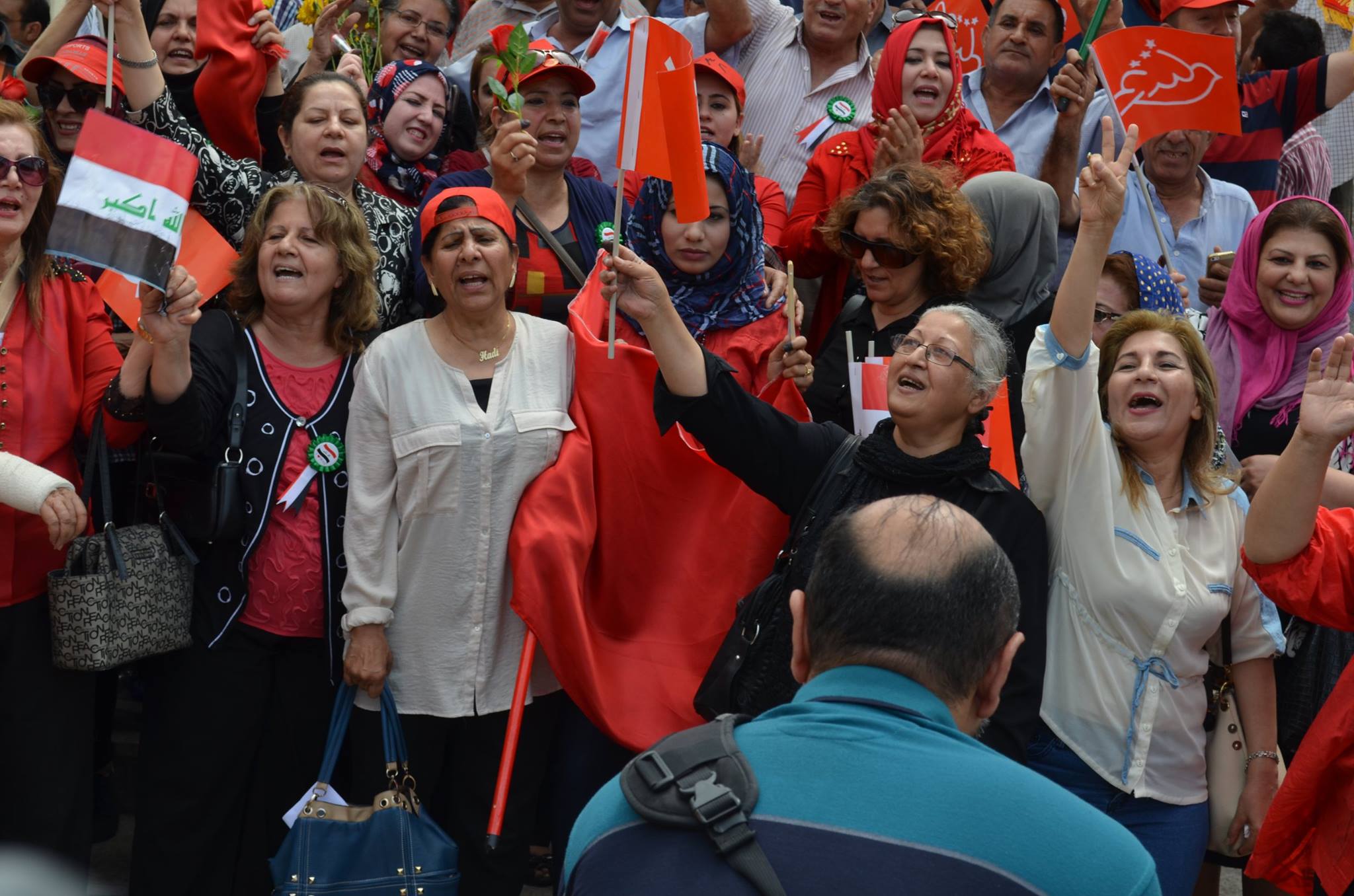
May 2, 2016
Iraq unions successfully pushed for a new labor law because of their unified solidarity and with strong support of the U.S. and global union movements, according to a new documentary.
“Finally, after 12 years of persistent and consistent work, the Iraq labor movement was able to succeed with their international partners and with Iraq civil society … to get worker rights in Iraq,” says Michael Zweig, speaking in the video. Zweig is director of the Center for Study of Working Class Life at Stony Brook University, which produced the video.
“It’s a very big deal,” he said.
“Light from the Darkness: The New Iraq Labor Law” looks at the key role of U.S. Labor against the War in rallying support of the U.S. union movement in support of Iraqi workers’ struggle for labor rights after the fall of Saddam Hussein.
“Labor solidarity was something a … steel worker or paper worker or janitor in the United States could understand. They knew that every worker in the world should be treated fairly,” said Gene Bruskin, co-founder of USLAW.
Also speaking the video, Solidarity Center Executive Director Shawna Bader-Blau says, “the role of U.S. Labor against the War was so important in galvanizing the support of American workers for…reaching out and educating thousands of thousands of American workers through their unions around the U.S. and around the world through their global outreach.”
Passed by the Iraqi Parliament in August, the labor law allows for collective bargaining, limits child labor, improves rights for migrant workers, provides better protections against discrimination at work and is the country’s first legislation to address sexual harassment at work. The law also enshrines the right to strike, banned since 1987.
Says Bader-Blau: “The Solidarity Center and U.S. Labor against the War were there for Iraqi workers.”
Check out “Light from Darkness.”
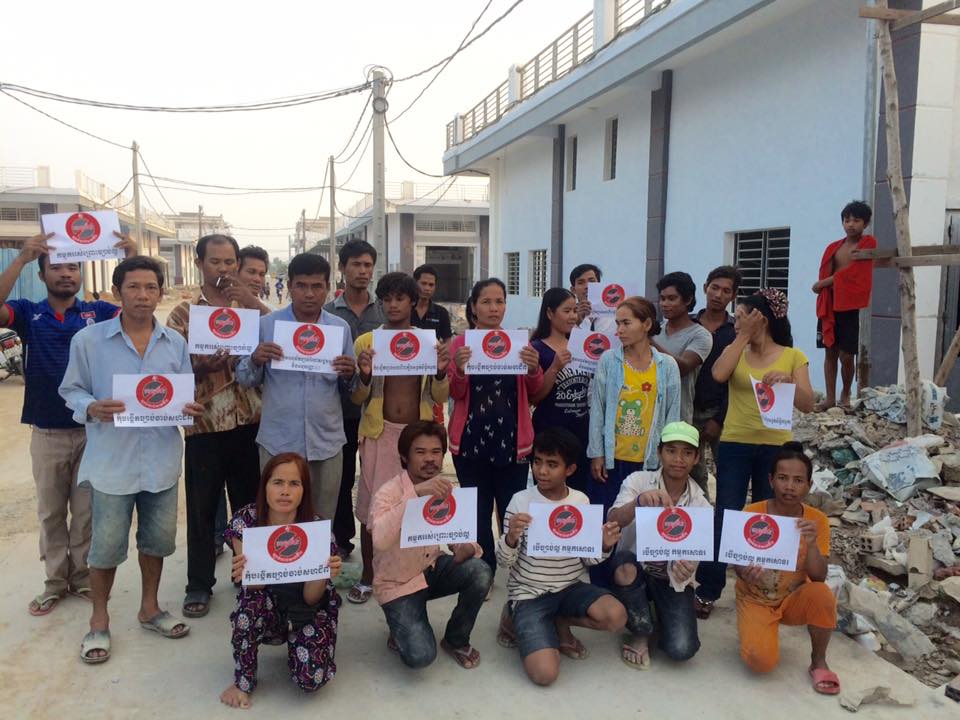
Mar 30, 2016
Workers across Cambodia are waging rallies to protest a draft labor law that, according to the International Trade Union Confederation (ITUC), does not meet basic worker rights standards under international law.
Carrying signs reading, “Do not create a law that oppresses worker rights” and “Workers survive because of good laws,” workers are taking a stand against the law that, if passed, would violate International Labor Organization (ILO) standards on freedom of association and protection for the right to form unions (Convention 87) and the right to bargain collectively (Convention 98).
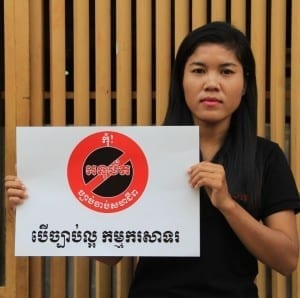
Cambodia’s draft labor law would make it easier for the government to break up unions. Credit: Um Mumsreypech
Workers from a wide variety of jobs also are posting on Facebook images of themselves and their co-workers with signs urging the government to pass a law that respects the rights of workers. (You also can follow the actions on Twitter with the hashtag #SayNoUnionLaw.)
In a letter sent this month to Cambodian Prime Minister Hun Sen, ITUC General Secretary Sharan Burrow urged the Cambodian government to work with unions to ensure the law is consistent with international labor standards. “We shall oppose any law which does not fully respect these rights,” Burrow wrote.
For instance, a strike would be legal only if approved by more than 50 percent of participants at a union meeting where more than half the union members are present—effectively making strikes impossible for unions with several thousand members.
The strike provision would especially impact the nation’s 700,000 garment workers, limiting their ability to seek improvements at the workplace. A Human Rights Watch report last year found that many Cambodian garment factories repeatedly violated fundamental worker rights, such as issuing unlawful short-term contracts to intimidate and control workers, and to avoid paying maternity leave and other benefits to the predominantly female workforce.
Ath Thorn, president of the Coalition of Cambodian Apparel Workers Democratic Union, told The Cambodia Daily that the limitations on calling a strike are a big concern. “In the Constitution, even one person can make a strike or demonstration,” he said. The Constitution says the right to strike and demonstrate “shall be exercised within the framework of law.”
The draft law also would enable courts to break up unions for infractions committed by a union leader.
Workers and their unions, along with community advocates, had worked on a draft trade union law several years ago that incorporated fundamental worker rights, but the draft died on the desks of the Council of Ministers. Cambodia union leaders say the current draft was compiled with minimal input from workers and their unions. It now goes before the National Assembly April 4.
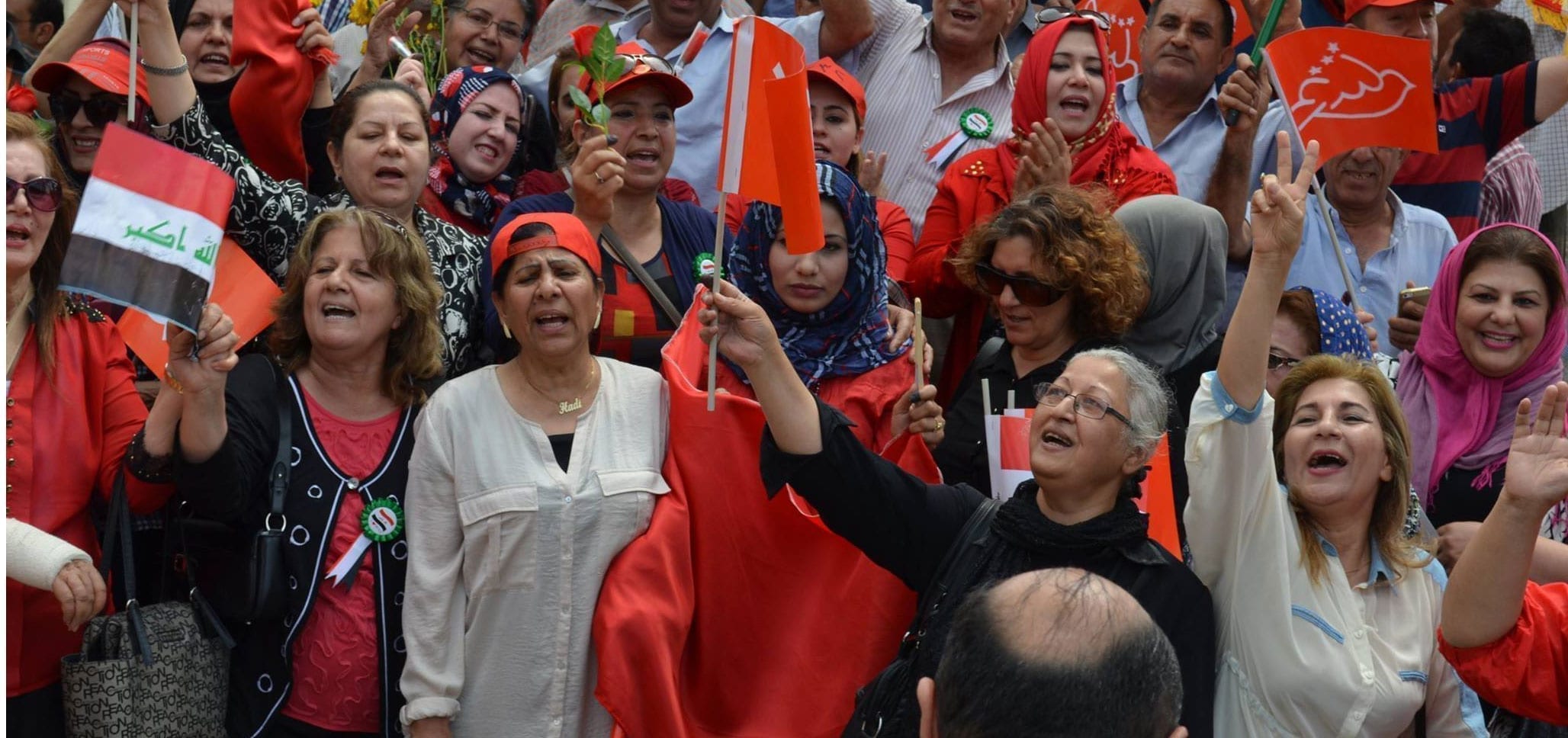
Mar 23, 2016
Women workers made important gains under Iraq’s new labor law, the country’s first ever to prohibit sexual harassment at the workplace. The law clearly defines sexual harassment and specifies penalties for perpetrators. Women union activists led their unions in fighting for this protection.
“The law also addresses the arbitrary dismissal of workers and other issues that will serve the interests of working women, which should encourage more women to work and enjoy those protections and rights,” says Saba Qasim Yousef, an officer in the women’s affairs department of the Iraqi Federation of Oil Unions (IFOU). Yousef was among many women taking an active role in the union movement’s labor law campaign.
Crucially, the law aims for gender equality, specifically regarding wages, hiring and working conditions. It requires employers to provide onsite child care, and increases paid maternity leave to 14 weeks, with the option of additional unpaid leave for up to a year. Employers must allow woman workers to return to their jobs or equivalent positions.
In effect on February 1, the law was a massive victory for Iraq workers and their unions and followed the Iraq union movement’s three-year campaign for passage of a labor law in line with International Labor Organization (ILO) conventions. The Solidarity Center provided essential support to the union movement throughout the campaign.

Iraq’s labor law includes protection against workplace sexual harassment. Credit: GFITU
Women Union Members Took Key Role in Drafting Labor Law
The labor law’s provisions addressing gender equality came about because women union activists and leaders participated in all aspects of the campaign—drafting amendments, taking part in conferences and meetings with parliament and the Ministry of Labor and Social Affairs (MoLSA) and advocating for its passage.
“Women had a leading role in the campaign to restructure the law draft by participating in the workshops and seminars,” says Ilham Abdul Ma’boud Majid, president of the Telecommunications Union, General Federation of Workers and Unions in Iraq (GFWUI), Basra Branch.
“Also, they were watching the developments in the process, despite their obligations as employees and mothers at home and the long distances they needed to travel to attend those activities,” she said. “They were motivated by the idea of having a modern labor law that will protect them from all kinds of discrimination.”
Labor Law Will Encourage Women to Join Workforce
The law’s new protections “will have a positive impact in increasing the number of women workers and guaranteeing their strong presence in the labor market, by treating them fairly at their workplaces with equality in terms of assignments and jobs,” says Alya’a Hussien Mahood, women’s affairs officer for the General Federation of Iraqi Trade Unions (GFITU).
The final draft, passed late last year, retained the unions’ input and is a significant victory for all workers because it expands coverage to workers not included in the civil service law. This means that workers in the public sector who are not civil servants have the chance to join and establish their own unions.
The law allows for collective bargaining, including for workers without a union, and provides a good frame for freedom of association and protections for unions and their members. It further limits child labor, improves rights for migrant workers, provides better protections against discrimination at work and is the country’s first legislation to address sexual harassment at work. The law also enshrines the right to strike, banned since 1987. (Highlights of the law’s improvements.)
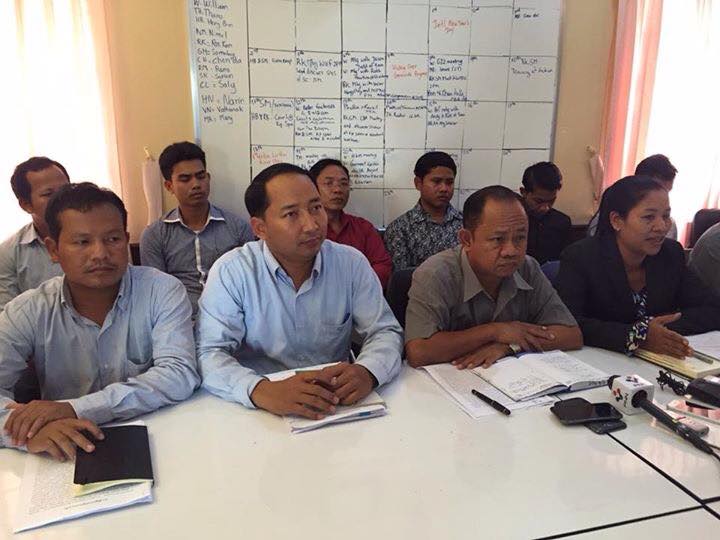
Jan 20, 2016
Union leaders are asking the Cambodia Royal Government and National Assembly to suspend adoption of a pending trade union law because of restrictions it would place on the freedom to form unions, collectively bargain and strike.
Following a strategy meeting today chaired by the International Trade Union Confederation Cambodia Coordinating Council, a dozen union leaders issued a joint statement calling on parliament to accept the group’s 17 previously submitted proposals. Unions want to see the draft labor law expanded to cover domestic workers, civil servants, state employees and informal economy workers, and seek more protections for the right to form unions and bargain collectively, in accordance with international labor standards.
The law “visibly restricts” worker rights that are recognized by the International Labor Organization (ILO), including the freedoms to form unions and bargain collectively, the unions said in a statement released at a press conference following their meeting.
The unions added that is essential to align Cambodian law with the international conventions it has ratified, including ILO conventions, as well as for promoting “the interests of all the workers and society, as well as our next generation.”
Union leaders have met several times with members of the Special Committee of the Parliament in charge of drafting the law, but say their detailed responses and recommendations have not been seriously considered.
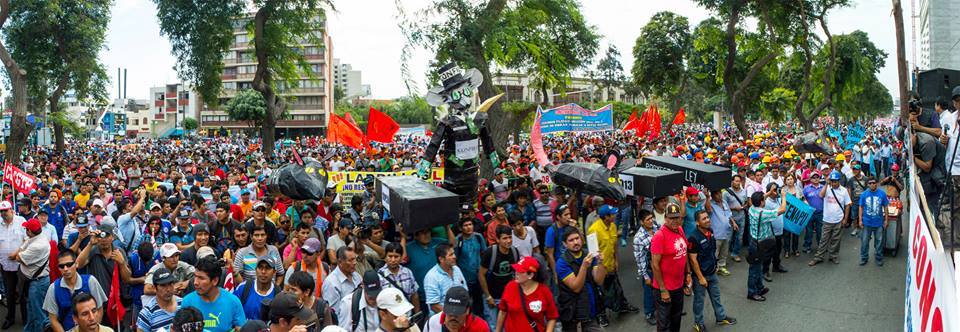
Apr 13, 2015
After thousands of Peruvian workers took to the streets on Thursday, the Peruvian government backed off a proposal (Supreme Decree 4008) that would have made it easier for employers to conduct mass layoffs. The proposed legislation also would have allowed employers to provide wage increases, up to 20 percent, in the form of bonuses which are not included in calculating benefits, and it would have limited the Labor Ministry’s oversight.
Spearheaded by the General Confederation of Workers of Peru (CGTP), the action led to workers’ second big victory this year. In December, young workers mobilized up to 30,000 workers and their allies in a series of marches protesting a new law that reduced salaries and benefits for workers under age 25. Lawmakers repealed the law in January.
Still on the books is a law passed in December that makes it easier for companies to conduct mass layoffs if they show two consecutive months of financial losses. This legislation, Supreme Decree 013, allows employers to eliminate 10 percent of their workforce if they can meet stipulated criteria—a loophole that empowers employers to target trade unionists, pregnant women, workers suffering from occupational safety and health illnesses and older workers. CGTP leaders, who met last week with the National Labor Council, say they are making progress in discussions to amend the law, and are meeting with the Prime Minister today.
Union leaders say worker awareness, mobilization and union-driven proposals for labor law reform are key to passing measures to improve workers’ standard of living, beat back regressive labor reforms and create the conditions for regaining union density and decent work in Peru.
The union movement plans further rallies and strikes in coming months, with public-sector workers set to mobilize for their rights on Wednesday.
In July 2013, the government passed a new civil service law that eliminated the right of more than 500,000 public administration workers to collectively negotiate salaries, narrows the definition of the type of unions they could establish and prevents “essential service” unions from striking (without defining essential services).
Public employees say the law violates International Labor Organization (ILO) Convention 151 that protects the right of public-sector workers to form unions. They are seeking to raise their case at Committee on Application of Norms in the annual ILO conference in June 2014. All four confederations are formally coordinating to take the issue to the meeting, and together with the global union Public Services International, the Solidarity Center is working to prepare the labor delegates for a united front to advocate on this key Peruvian labor issue at the ILO.







